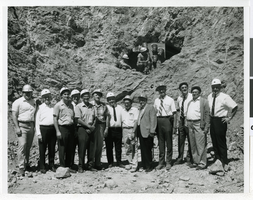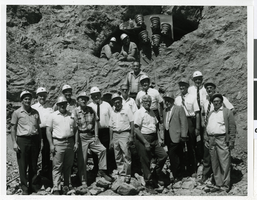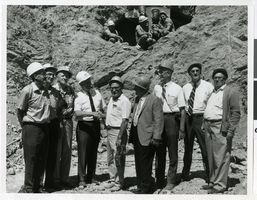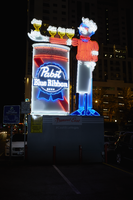Search the Special Collections and Archives Portal
Search Results

Photograph of Key federal, state and contractor representatives who were on hand when the mole broke through the tunnel, Las Vegas, Nevada, 6-26-69
Date
Archival Collection
Description
Image

Photograph of Key federal, state and contractor representatives who were on hand when the mole broke through the tunnel, Las Vegas, Nevada, 6-26-69
Date
Archival Collection
Description
Image

Photograph of Key federal, state and contractor representatives who were on hand when the mole broke through the tunnel, Las Vegas, Nevada, 6-26-69
Date
Archival Collection
Description
Image

Photographs of Pabst Blue Ribbon sign, Las Vegas (Nev.), June 28, 2017
Date
Archival Collection
Description
Site address: Fremont St and Las Vegas Blvd
Sign owner: PBR Donated, but a part of Fremont Street East
Sign details: PBR held a revealing party when installed in 2015, right next to The Park on Fremont. YESCO manufactured the 30 feet tall sign is nicknamed Cool Blue. Previous to this sign in this location the Maharaja Hookah Cafe had their signage in the same location previous to 2013.
Sign condition: 5, just installed in 2015 so neon and paint are still in great condition
Sign form: Free Standing Sign
Sign-specific description: 30 feet tall, the sign is nicknamed Cool Blue. A 30 foot waiter holding his arm out with 3 beers on his arm and one in his hand. The beers are animated with them lighting up in order starting with the one closest to his body. His arm is resting on a PBR can. The waiters shirt and cheeks illuminate red neon while the rest of his body illuminates blue argon. The PBR beer can illuminates red and blue as well.
Sign - type of display: Neon
Sign - media: Steel
Sign animation: The Beer cans on the waiters arm light up in order, starting with the one closest to his body.
Sign environment: This is located in the parking lot on the corner of Las Vegas Blvd. North and Fremont St. East next to the Park on Fremont. This marks the beginning of the Fremont Street East District were other freestanding Neon signs are as well.
Sign manufacturer: YESCO
Sign - date of installation: 2015
Sign - thematic influences: The retro theme makes it look like a throwback to 1950s/60s advertisement. Also since it is for a beer company it shows that Neon does not always have to be for the Casinos here in Vegas. This is one of the first freestanding signs you see in the Fremont Street East District, thus showing that the Neon community downtown still is thriving and still defines our culture here.
Survey - research locations: YESCO website http://www.yesco.com/news/yesco-installs-pabst-blue-ribbon-neon-sign/ , Vital Vegas website https://vitalvegas.com/downtowns-fremont-east-gets-a-new-neon-sign-courtesy-of-pbr/ , google map roadside view
Survey - research notes: Since this is a freestanding sign it is difficult to find any specific information on a single owner or why this sign was placed there specifically.
Surveyor: Emily Fellmer
Survey - date completed: 2017-07-22
Sign keywords: Neon; Steel; Back to back; Monument sign
Mixed Content

Photographs of Vanguard Lounge sign, Las Vegas (Nev.), June 28, 2017
Date
Archival Collection
Description
Site address: 516 Fremont St
Sign owner: Andrew and Jennifer Wheatley
Sign details: The building was originally constructed in 1951. Previously to the lounge opening it was Fremont Street Guitars. Andrew and Jennifer Wheatley opened the lounge in 2010 after 30 years of experience together in the industry. This trendy bar has Modern-Industrial Decor, as you can see with their black building with a glass garage door entrance.
Sign condition: 5- newer sign that lights up brightly at night
Sign form: Hanging sign
Sign-specific description: Right above the entrance is a black canopy, but at night a white neon tube illuminates the perimeter of the canopy. The canopy also showcases their street address 516 in white channeled numbers. Above the canopy there is a beam which acts as a support for their main sign. Their main sign is a black rectangle which is also attached to the building. The sign states Vanguard Lounge in white skeletal neon letters. The word Vanguard is in a thick block-type print letters. Lounge is written in a smaller but similar type-font.
Sign - type of display: Neon
Sign - media: Steel
Sign environment: This is located in the Fremont East district in between Las Vegas Blvd. and 6th St. This locations storefront is located in between the Therapy restaurant and Red dance club (used to be the old Coin Insert bar).
Sign manufacturer: Valley Signs and Lighting
Sign - date of installation: 2010
Sign - date of redesign/move: Vanguard used the old sign box that the previous company used and added their logo in neon in 2010.
Sign - thematic influences: The skeletal neon showcases a simple yet classic design. It also showcases the Modern trendy vibe.
Sign - artistic significance: The sign does have a modern vibe but is staying true to the Neon culture of downtown.
Survey - research locations: Vanguard lounge website http://www.vanguardlv.com/vanguard_lounge_venue , Las Vegas Sun https://lasvegassun.com/news/2010/sep/20/vanguard-lounge-opens-fremont-street/ , Assessor's page
Survey - research notes: Definition of Vanguard is a group of people leading the way in new developments/ideas. This is possibly alluding to their theme of being different than the other bars downtown. Coincidentally there was a dance club in L.A. also called Vanguard, but no connection found between the properties besides their modern dance vibes.
Surveyor: Emily Fellmer
Survey - date completed: 2017-08-11
Sign keywords: Neon; Steel; Hanging; Pole sign; Roof Sign
Mixed Content

Transcript of interview with George Pollak by Claytee White, May 25, 2010
Date
Archival Collection
Description
George was raised in Mattapan, a suburb of Boston, by his mother and father. George had four siblings and was the second youngest. George shares fond memories of growing up and playing softball and tennis in the neighborhood park with his numerous friends. George could listen to a song on the radio and play it on the piano by ear when he was as young as four years old. George had several jobs to earn money growing up, including working in a record store and as a busboy. Eventually George and his brother joined a trio with Steve Harrington and performed in clubs. In 1958, George joined his brother and Paulette Richards in Las Vegas where they had a contract to play at El Rancho Hotel & Casino where they played until it was destroyed by fire. Following the fire, George and his brother parted ways and each did their own thing. In the 1960s, George began playing with the band at Caesars Palace. George used his background in accounting to do some bookkeeping and payroll for some of the ban
Text

Transcript of interview with Dayvid Figler by Barbara Tabach, June 22, 2016
Date
Archival Collection
Description
Dayvid Figler (1967 - ) is the quiet boy who became an insightful and creative contributor to the local culture of Las Vegas. The oldest of Barbara and Meyer Figler?s three children, he was four years old when the family station wagon reached Las Vegas in 1971. They moved in with Uncle Izzy (aka Big Irish) Figler for a few months. Having the ?juice,? Dayvid?s father soon became a Pan dealer on the Strip. As the family grew, Barbara eventually immersed her energies in her children?s activities, Hadassah and Temple Beth Sholom. In this oral history, Dayvid also recalls his awkward, but incredibly interesting youth, his bar mitzvah at Temple Beth Sholom, and path to a successful career as a criminal defense attorney. He also talks about embracing Las Vegas as his home, owning a home in John S. Park neighborhood and mentions a number of literary depictions of Las Vegas that he admires. Dayvid describes growing up a ?casino kid? who lived in an apartment near the Riviera Hotel. This, in addition to his slight stature and academic brilliance, may have set him apart from many of his childhood peers. He graduated from Valley High School at the age of 16 and by the age of 23 he was a rising star in the legal world. He looks back with appreciation to his list of mentors who encouraged him along the way. Dayvid is also a local favorite as an essayist and poet. For a number of years he could be heard on KNPR/NPR. He has been a performer in hundreds of productions that featured his comic wit and writings, from Lollapalooza to Tom and Jerry?s on Maryland Parkway.
Text

University of Nevada, Las Vegas (UNLV) 23rd commencement program
Date
Archival Collection
Description
Commencement program from University of Nevada, Las Vegas Commencement Programs and Graduation Lists (UA-00115).
Text

Interview with Robert Campbell, March 9, 2004
Date
Archival Collection
Description
Text
